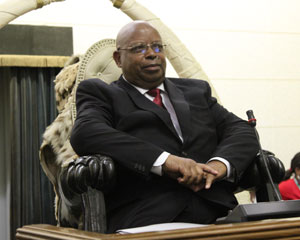
BY MIRIAM MANGWAYA
Parliament’s controversial passing of proposed amendments to the constitution is now being challenged at the Constitutional Court (ConCourt) on the grounds that the process violated the country’s supreme law.
A fortnight ago, Senate passed Constitution Amendment Bill No 1, which among other things will give the president the sole power to appoint the chief justice, deputy chief justice and judge president of the High Court.
Nqobani Sithole, a Bulawayo-based lawyer, on Friday approached the ConCourt seeking the reversal of the amendments, arguing that the Senate failed to exercise its legislative role as provided for in the constitution by passing a Bill that lapsed in July 2018.
Zanu PF was assisted by the Douglas Mwonzora-led MDC-T to push the Bill through Senate and it now awaits President Emmerson Mnangagwa’s signature before it becomes law.
Sithole, who is represented by lawyers from Ncube and Partners, argued that the Bill ceased to exist as part of the agenda of the Eighth Parliament on July 29 2018 after a dispute over the piece of legislation in the Senate spilled to the ConCourt.
The ConCourt in March 2020, ordered a fresh voting process for the proposed constitutional amendments.
Sithole cited speaker of parliament Jacob Mudenda, Senate president Mabel Chinomona, Justice minister Ziyambi Ziyambi and Mnangagwa as respondents in the matter.
- Chamisa under fire over US$120K donation
- Mavhunga puts DeMbare into Chibuku quarterfinals
- Pension funds bet on Cabora Bassa oilfields
- Councils defy govt fire tender directive
Keep Reading
“I am advised that if Parliament, the first respondent, desired to steer through the Constitution of Zimbabwe Amendment No.1 Bill, it should have commenced the process afresh in keeping with the procedures prescribed in section 131 of the constitution,” the lawyer said in his founding affidavit.
“I, therefore, seek a declaratory order that all processes arising from restoration and passage of the Bill by the Senate are of no force or effect.”
Sithole argued that in July 2017, the Bill was debated and passed in the National Assembly after it had received the required votes.
As prescribed in the constitution, the Bill required two-thirds of the Senate votes for it to be signed into law, but the voting process was contested by legislators Jessie Majome and Innocent Gonese.
Sithole said the ConCourt ruling upheld the legislators’ argument that the Senate failed to achieve the two-thirds majority votes required to pass the Bill into law.
“As of the relief granted under CCZ4/20, this honourable court ordered that the Senate had to conduct a fresh vote in respect of Constitution Amendment Bill 1 (HB 1A, 2017) in accordance with the procedure for amending the constitution within 180 days of the grant of the order,” he added.
“In terms of section 147 of the constitution, proceedings pending at the time of dissolution of the Eighth Parliament were terminated and every Bill, motion, petition and other business of that Parliament lapsed on dissolution.”
He said the Bill was never part of the Ninth Parliament and seeks the court to nullify all the proceedings which led to its passing in the Senate.
“Our country is a constitutional democracy, meaning the constitution is the supreme law and any law, conduct, practice or custom inconsistent with it, is null and void to the extent of the inconsistency,” Sithole said.
“During the life of the Eighth Parliament, the fourth respondent (Chinomona) tabled Constitutional Amendment Bill No. 1 of 2017, the provisions of which sought to amend several sections of the constitution including the manner in which the appointment of the judicial officers was to be done.”
The matter is yet to be heard.










